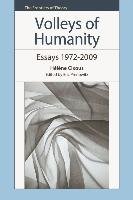Volleys of Humanity is perhaps the richest single volume of Cixous' critical writings yet published in English. A lucid and beautiful introduction by Eric Prenowitz leads into an explosive salvo of texts, ranging from early essays already justly famous ('Fiction and its Phantoms' and 'The Character of Character"') to the tremendous title-essay 'Volleys of Humanity', first published in French in 2009. There are also remarkable essays (previously unpublished in English) on Joyce, Clarice Lispector ('the greatest writer in the twentieth century'), and Michel Foucault, as well as on Algeria, US politics and theatre, cities and the unforeseeable."Nicholas Royle, University of Sussex"As essayist, Hélène Cixous always astonishes with the unforeseeable volleys of her poetically driven, politically riven prose. How fortunate her English language readers are to find these priceless texts together in one volume. Time, almost forty years, has passed, but untouched is the absolute youth and vitality of every line."Professor Peggy Kamuf, University of Southern CaliforniaSEEKING AUTHOR-APPROVALThe Frontiers of TheorySeries Editor: Martin McQuillan, Kingston UniversityThis series brings together internationally respected figures to comment on and re-describe the state of theory in the twenty-first century. It takes stock of an ever-expanding field of knowledge and opens up possible new modes of inquiry within it, identifying new theoretical pathways, innovative thinking and productive motifs.Volleys of Humanity: Essays 1972-2009Hélène CixousEdited by Eric PrenowitzThe most substantial collection of ground-breaking writings by Hélène Cixous to dateSpanning nearly 40 years, these 15 essays - four previously unpublished in the original French, five published in English for the first time and two appearing in substantially revised translations - range from sophisticated literary analysis to theoretical and political manifesto, from cultural critique t

